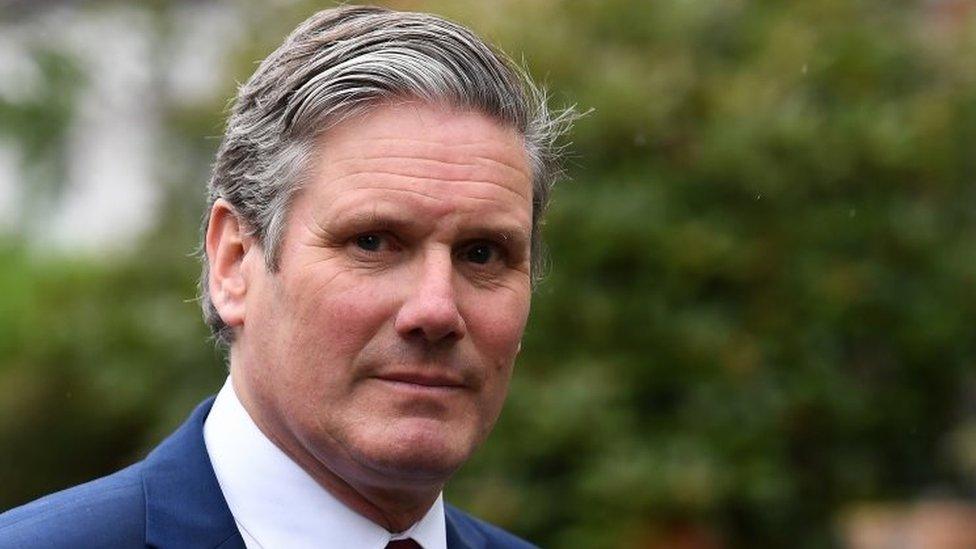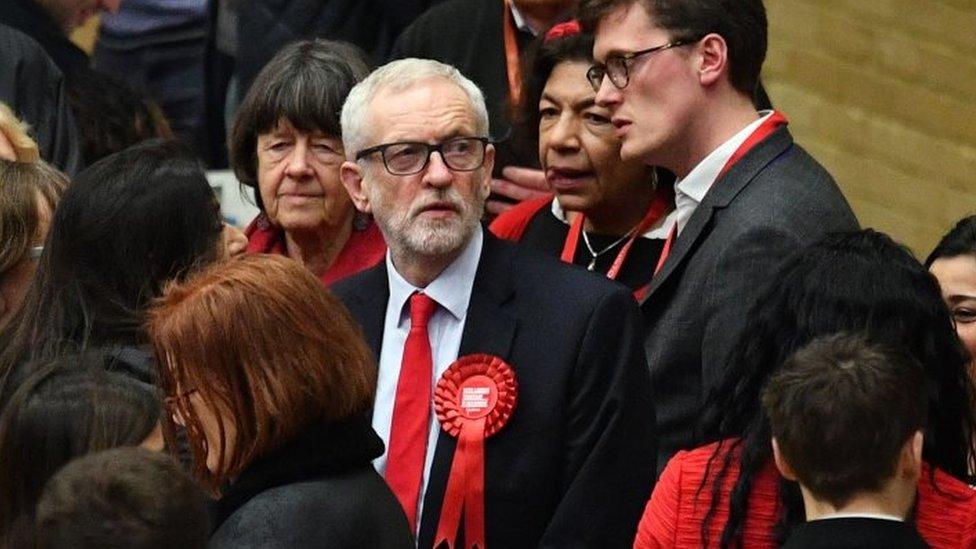Election 2019: New leader not enough to win again, Labour warned
- Published
- comments

Sir Keir Starmer was elected Labour leader in April
A new leader and the end of Brexit as an election issue will not be enough for Labour to win back power, a review of the party's 2019 defeat has warned.
The Labour Together project says the party has a "mountain to climb" after slumping to its lowest number of seats since 1935 in December's poll.
It says the historic defeat had been a "long time coming" and deep-seated changes were needed.
Labour will have been out of power for 14 years by the next election in 2024.
The Conservatives won December's election with a majority of 80, while Labour lost 59 seats and saw its vote share fall by eight points.
Labour's defeat led to the resignation of Jeremy Corbyn as party leader. He was replaced in April by Sir Keir Starmer.
The Labour Together report, external, which was largely compiled before the coronavirus pandemic, warned that "disunity and division within our party over time has badly damaged our electoral fortunes".
And the commissioners of the review agreed it would "be a mistake to believe that a different leader, with Brexit no longer the defining issue, would in itself be sufficient to change Labour's electoral fortunes".
The organisation, which describes itself as a network of activists from all Labour traditions, surveyed 11,000 members, held in-depth interviews with former MPs and party candidates, and spoke to polling experts and academics.
It identified a manifesto viewed as "undeliverable" by many voters, concerns about Mr Corbyn's leadership and the party's position on Brexit as the "interlinked and indivisible" factors behind the 2019 defeat.
But it says the party's problems run far deeper and its failure to properly analyse previous defeats "sowed the seeds for our failure in 2019".
Mr Corbyn has said Labour "won the argument" at last year's election but blamed media bias for the party's defeat and the fact that the campaign was dominated by Brexit.


The report paints a portrait of a party riven by "factionalism", "internal arguments" and "division".
But it issues a stark warning to those who believe that a change in both the party leadership and in the political landscape will necessarily bring Labour much closer to power.
The report says: "It would be a mistake to believe that a different leader, with Brexit no longer the defining issue, would in itself be sufficient to change Labour's electoral fortunes."
And this is perhaps the true value of the report for the new leadership - it serves as both a reality check for activists and an opportunity for the new regime to argue that a break for the past is necessary.
It declares that Labour has "a mountain to climb" - and the authors are clearly thinking of K2 rather than a Scottish munro.

The Labour Together review was headed by MP Lucy Powell - who ran Ed Miliband's unsuccessful 2015 election campaign, leading the party to win more seats than Mr Corbyn in 2019, but with a slightly lower vote share.
Speaking to BBC Radio 4's Today programme, she said Labour needed to address a long-standing "disconnect" with working-class voters to win again.
'Long-term decline'
The "red wall" of seats in the party's traditional strongholds, she said, had "been crumbling for twenty years".
She said there was "no sign yet that long-term decline is in any way abating," adding it could put a number of Labour MPs in formerly safe seats at risk in future.
Mr Miliband, who has returned to the shadow cabinet under Sir Keir and was a member of the Labour Together panel, said winning the next election would be a "Herculean task".
Writing for the Guardian, external, he said the party's "new core vote" of younger graduates in big cities are "not enough on their own to win us the election".
But he said the party needed to maintain a commitment for "economic transformation," adding this was desired by both Leave and Remain voters.

Jeremy Corbyn said he would stand down after the 2019 election loss
The report said responsibility for the defeat did not rest "wholly with one side or part of our movement".
But it said Mr Corbyn's low poll ratings going into the election could not "easily be disentangled from the handling of issues like Brexit, party disunity and anti-Semitism".
Momentum, the campaign group formed out of Mr Corbyn's successful 2015 leadership bid, called the report a "much needed contribution" to the debate over Labour's future election strategy.
A spokesperson said the party needed to "professionalise the party machine," and better engage party members through "community organising".
They added the group was happy to offer its "expertise" in digital campaigning to help the party reach more voters online.
Other issues highlighted in the report included:
Labour losing all types of voters compared with the 2017 election, but losing support amongst working class communities the most
The loss of voters "stretched back over two decades", especially with those who ended up voting Leave in the 2016 EU referendum
The party "suffered a meltdown" in Scotland over Brexit, the leadership and Labour's position on a second independence referendum
Labour "lost the online campaign", spending too much time talking to its own members, rather than persuading other voters to support them.
In its recommendations, the report warned Labour could "could fall further, unless it faces up to the disconnect between the party and the public and is realistic about the scale of the political and organisational task ahead".
It said the party needed to "build a winning coalition of voters which spans generations, geographies and outlooks", while holding onto Labour's existing supporters and "inspiring more younger voters".